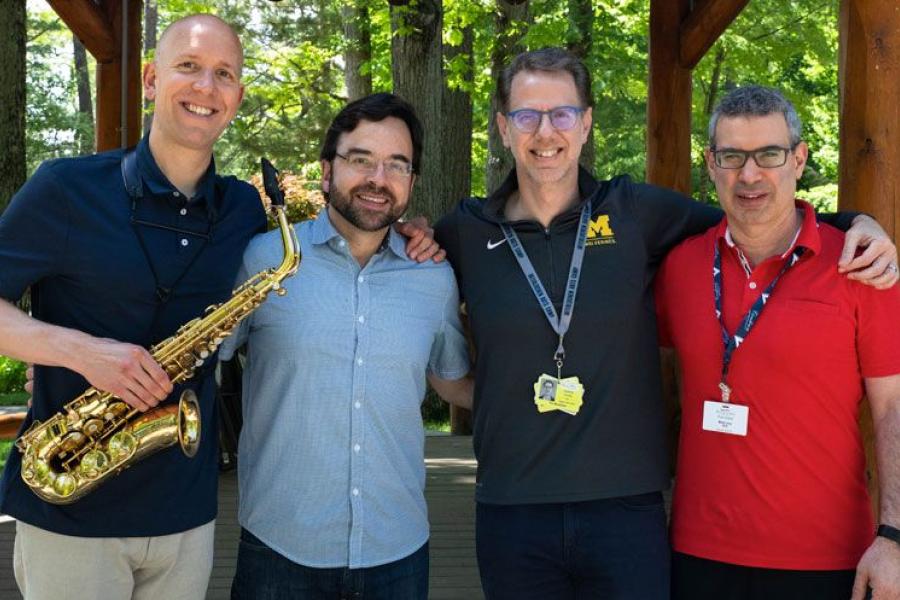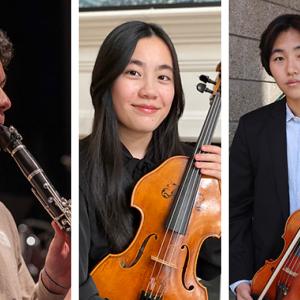Applications are still open for Arts Camp and Arts Academy. Programs fill quickly—submit your app today!
From stately pines to center stage
Classical saxophonist Timothy McAllister advances new music and new artists through his roles as a teacher and member of PRISM.
For most woodwind students, the path to a successful career in music is challenging, but relatively straightforward: Practice diligently, attend a top conservatory, win an audition, and join an orchestra.
For saxophonists, the path isn’t obvious. With orchestral openings operating on a freelance basis and solo opportunities reserved for the very finest musicians, saxophonists must learn to be versatile and open-minded.
Timothy McAllister (IAC 90, IAC St 92-96, AS St 96, IAC Fac 01-14, 16-19) is one of the lucky ones. He’s sought-after as a soloist and has been a member of the acclaimed PRISM quartet for nearly 20 years. But he’s never forgotten the importance of versatility, a lesson he first learned as a student at Interlochen Arts Camp. Decades later, McAllister instills the same mentality in his students at the University of Michigan, Interlochen Arts Camp, the Interlochen Saxophone Institute, and now, Interlochen Online.
“This is the moment in their life that students will look back upon as the beginning of their dreams,” McAllister said in a recent interview. “Hard work and determination are required past this point, but Interlochen is the place where the blueprint begins.”
Discovering the blueprint
In the summer of 1990, McAllistermade the thousand-mile journey from Houston, Texas to Interlochen. “Back then, Interlochen was eight weeks long, and it felt daunting to leave home for two whole months,” he said. “But I knew that it was going to be a life-changing experience.”
During his summer at Camp, McAllister studied with John Sampen (IAC/NMC 65-66, IAC Fac 90-97) and played alongside future saxophone greats Otis Murphy (IAC 90) and Preston Duncan (IAC 90, IAC St 91-93, 97) in the Camp’s Symphonic Band. His most transformational experience, however, was meeting University of Michigan Saxophone Instructor Donald Sinta (IAC Fac 64-66, 77, 85, 89, UNIV 82-84, 86-88, 90, 92). “I got to perform in a master class with him and heard him play in a faculty recital,” McAllister said. “Those two experiences cemented my desire to study with him.”
After high school, McAllister enrolled at the University of Michigan. During his senior year, the baritone saxophone position in the acclaimed PRISM Quartet became available. McAllister auditioned, and although he was called back as a finalist, the vacancy went to Taimur Sullivan. McAllister caught the ensemble’s eye, however, and the group invited him to become one of their regular substitutes.
Living the dream
McAllister moved forward with his education, earning master’s degrees in saxophone performance and conducting from the University of Michigan. “Saxophonists have to be open to the idea that we are going to be jacks of all trades,” McAllister said. “While I would fantasize about having a solo career, I knew only a select few would get those opportunities. Instead, I saw myself becoming a band director at the high school or college level.”
By the time he completed his master’s degrees, McAllister had two job offers: One as an assistant high school band director, and one as an instructor of saxophone at the State University of New York at Potsdam.
“It was a fork-in-the-road moment for me,” McAllister said. “I had envisioned two possible career paths, and both were staring me in the face. Ultimately, because of my love for the saxophone and dream of being a performer, I chose the college pathway.”
The choice quickly paid off: In 2001, McAllister was asked to join PRISM full-time as the ensemble’s soprano saxophonist.
McAllister joined the ensemble at a pivotal moment. “PRISM had just started a professional push to do more and change their business model,” McAllister said. “They decided to focus solely on the creation of original music. That’s when things really opened up. We were no longer trying to compete against chamber groups who were doing standard repertoire.”
Today, PRISM remains committed to new music, having premiered more than 200 pieces and produced more than 40 albums. “We take deep pride in working with some of the top names in the field, but we’re also very committed to young, emerging composers in a wide range of styles,” McAllister said. “We’re very invested in diversity and inclusion. We want to recognize creative voices that represent all facets of the social fabric of the United States and the world.”
Paying it forward
2001 also marked McAllister’s first year as a faculty member at Interlochen’s core Arts Camp. “I think part of the appeal of being a faculty member is rekindling some of that childhood spark and being able to pay that forward to the next generation,” he said. “Interlochen is one of the destinations for high school students who have any kind of artistic aspirations. Students truly see it as an access point to a career in music. I view my role as providing that access point and giving them that blueprint of what it takes to succeed.”
In 2013, McAllister and PRISM joined Arts Academy Saxophone Instructor Dr. Matthew Schlomer in founding the Interlochen Saxophone Institute. McAllister and his colleagues Zach Shemon, Matthew Levy, and Taimur Sullivan continue to serve as the Institute’s core faculty.
“Over the first summer, the Institute emerged as a program that focused on the saxophone quartet and playing in ensembles,” McAllister said. “Students learn what it means to be in a quartet through PRISM’s experience and expertise.”
Although the Interlochen Saxophone Institute will not be able to meet in 2020, McAllister and his colleagues are eager to teach the students of Interlochen Online. PRISM plans to combine elements of the on-campus institute with a special emphasis on digital artistry in the program.
“Interlochen Online is not intended to replace or re-create Arts Camp, but to help students understand and capitalize on the digital rebranding that we’re seeing in the arts,” he said. “We want to encourage students to record themselves more and develop better digital media for themselves. It’s not only an opportunity to better themselves as performing artists and future teachers, but also a chance to explore the expectations for college auditions and become facile with technology. It’s an exciting component of saxophone education.”
Last summer, during the final World Youth Wind Symphony performance of Arts Camp 2019, McAllister joined the ensemble as the soloist for Joel Love’s Solace: A Lyric Concerto. At that moment, the circle begun 30 years ago was complete. The awestruck teenager who had watched Donald Sinta was now the one on stage, inspiring the awe of the next generation of saxophonists.
“Interlochen has helped frame my entire experience as a musician,” McAllister said. “All of my teaching is informed by my history at the Camp. It’s just been a fixture of my life.”







